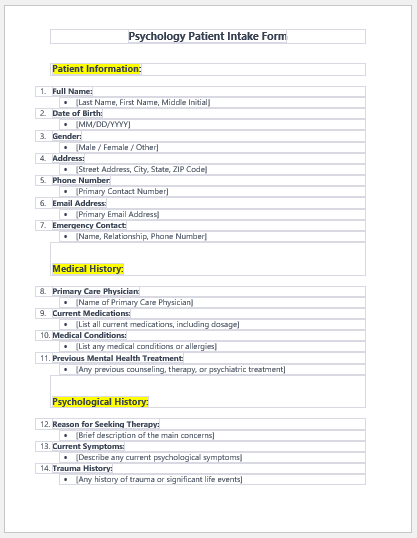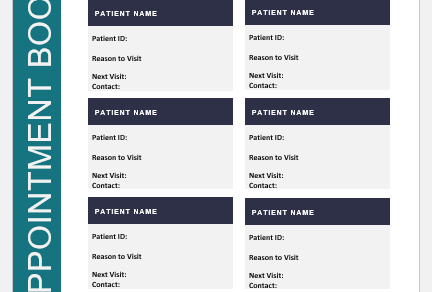The mental health of a person is as important as his physical health, and this is why people have to go through the same procedure when they visit a mental health care professional for treatment for mental disease.
Mental healthcare professionals have to gather information about the patient who visits their clinic for a regular checkup. The tool that is used by clinics and hospitals is known as the psychology patient intake form.
This form is generally used for those who visit the clinic for the first time. Therapists usually have no data about a person visiting them for the first time, and therefore, they require their medical information which they capture through the intake form.
The importance of using the patient intake form
Counselors who have to give the right treatment to a person suffering from any sort of mental illness usually require information that they can process and determine the medical needs of the patient.
The counselors can easily understand the background of the patient, which helps them with quick and easy diagnostics. If the data is accurate and the information is based on facts and figures, it will be very easy for the doctor to suggest the right type of treatment for that patient.
It is not easy to treat a mental disease as it is not visible, unlike many other physical diseases. So, doctors have to be very considerate when they are treating a patient. Therefore, they try to make sure that the foundation of the treatment, which is the information provided by the patient through the form, is strong and there is no confusion.

Form File: 136 KB
What information does a patient needing mental care intake form include?
This form is divided into various sections, and each section is based on the specific type of information needed by the therapist to initiate the treatment. Here is the description of each section:
The section about the patient’s information
The first part of the form is about the patient and his information usually includes empty fields about his name, age, date of birth, gender, phone number, home address, email address, occupation, etc.
These details are usually collected to make sure the hospital facility reaches the patient promptly. In addition, there is so much a doctor can know about the patient through the given information.
Section regarding the therapy being sought
Some patients visit therapists for a particular therapy that they know and feel they can benefit from. They mention the name of that therapy, and then they also have to provide the reason for which they want to seek that treatment. In some cases, patients don’t know anything, and they only have to mention the reason for visiting the psychologist, as it is also regarded as a reason for seeking therapy.
The section about medical history
This is the most important part of the form, as most therapists take insight from this document and create a treatment plan for their patients.
In this section, the patient is asked to provide the name of the mental or physical illness he was previously diagnosed with, the name of the medication he is currently taking, the name of the physician from whom he is getting the treatment, the duration of the mental or physical illness, and much more.
Information regarding health insurance
Some healthcare practitioners also want to know if the patient is the policyholder of any insurance policy related to health. If yes, the patient is also required to provide the name of the insurance company from which he purchased the insurance policy. Some clinics already have an association with those companies, and they provide a treatment plan at a discount to those patients.
Signatures
The person who fills out the form has to sign it at the end, which becomes evidence of the fact that the information has come from a specific source. If the form is being filled out by some close relatives of the patient, they will have to sign it, as the person who provides the information is held accountable for the information he provides, and his signatures are a must in this situation.
- Nursing Documentation Templates
- Mental Health Evaluation Forms
- Forms Used by Pediatricians
- Various Forms Related to Pregnancy Verification
- Common Forms Used by ENT Specialists
- Pain Diary Worksheet Template
- Forms Commonly Used by Old Age Homes
- Medical Treatment Consent Form
- Home Exercise Program Worksheet
- Forms Used for Mental Health Assessment
- Forms Used by Psychologists
- Medical Forms Commonly Used by/for Students


